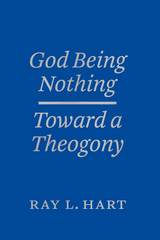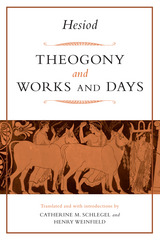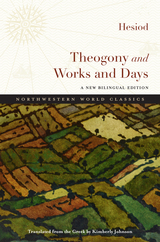3 books about Theogony

God Being Nothing
Toward a Theogony
Ray L. Hart
University of Chicago Press, 2016
In this long-awaited work, Ray L. Hart offers a radical speculative theology that profoundly challenges classical understandings of the divine. God Being Nothing contests the conclusions of numerous orthodoxies through a probing question: How can thinking of God reach closure when the subjects of creation are themselves unfinished, when God’s self-revelation in history is ongoing, when the active manifestation of God is still occurring?
Drawing on a lifetime of reading in philosophy and religious thought, Hart unfolds a vision of God perpetually in process: an unfinished God being self-created from nothingness. Breaking away from the traditional focus on divine persons, Hart reimagines the Trinity in terms of theogony, cosmogony, and anthropogony in order to reveal an ever-emerging Godhead who encompasses all of temporal creation and, within it, human existence. The book’s ultimate implication is that Being and Nonbeing mutually participate in an ongoing process of divine coming-to-birth and dying that implicates all things, existent and nonexistent, temporal and eternal. God’s continual generation from nothing manifests the full actualization of freedom: the freedom to create ex nihilo.
Drawing on a lifetime of reading in philosophy and religious thought, Hart unfolds a vision of God perpetually in process: an unfinished God being self-created from nothingness. Breaking away from the traditional focus on divine persons, Hart reimagines the Trinity in terms of theogony, cosmogony, and anthropogony in order to reveal an ever-emerging Godhead who encompasses all of temporal creation and, within it, human existence. The book’s ultimate implication is that Being and Nonbeing mutually participate in an ongoing process of divine coming-to-birth and dying that implicates all things, existent and nonexistent, temporal and eternal. God’s continual generation from nothing manifests the full actualization of freedom: the freedom to create ex nihilo.
[more]

Theogony and Works and Days
Hesiod
University of Michigan Press, 2006
Written in the late eighth century BC by Hesiod, one of the oldest known of Greek poets, Theogony and Works and Days represent the earliest account of the origin of the Greek gods, and an invaluable compendium of advice for leading a moral life, both offering unique insights into archaic Greek society. There are a number of modern translations of Hesiod available, rendered in serviceable English, but until now no one has created a work of literature equal to the original. This translation is the result of a unique collaboration between a classicist and a poet, capturing in English fourteeners the works’ true poetic flavor while remaining faithful to the Greek text and the archaic world in which it was composed.
This translation contains a general introduction, a translator’s introduction, notes, and a glossary. It will be of interest to general readers, students of and specialists in classical literature, and lovers of poetry.
"This Schlegel-Weinfield translation of Hesiod is superbly crafted: compelling, unforgettable poetry to be read aloud with delight and gratitude."
—Allen Mandelbaum, Endowed Kenan Professor of Humanities, Wake Forest University
"This exciting and unique collaboration between a classical philologist and a poet will not just provide insight into archaic Greek society, but also offer something new: the opportunity to experience the richness of Hesiod's style, language, and modes of thought with remarkable fidelity to the ancient Greek. Weinfield and Schlegel make Hesiod sing."
—Carole Newlands, Classics Department, University of Wisconsin
"Schlegel and Weinfield have produced one of the most remarkable of a current resurgence of translations from the classics, allowing the modern world to hear a poet who may have known Homer. Hesiod’s song makes us understand why the Greeks thought a poet could draw dolphins through the seas or raise the walls of Thebes. Weinfield translates by ear and transfers what he hears to the page, resonant fourteeners, a worthy echo of the past."
"This Schlegel-Weinfield translation of Hesiod is superbly crafted: compelling, unforgettable poetry to be read aloud with delight and gratitude."
—Allen Mandelbaum, Endowed Kenan Professor of Humanities, Wake Forest University
"This exciting and unique collaboration between a classical philologist and a poet will not just provide insight into archaic Greek society, but also offer something new: the opportunity to experience the richness of Hesiod's style, language, and modes of thought with remarkable fidelity to the ancient Greek. Weinfield and Schlegel make Hesiod sing."
—Carole Newlands, Classics Department, University of Wisconsin
"Schlegel and Weinfield have produced one of the most remarkable of a current resurgence of translations from the classics, allowing the modern world to hear a poet who may have known Homer. Hesiod’s song makes us understand why the Greeks thought a poet could draw dolphins through the seas or raise the walls of Thebes. Weinfield translates by ear and transfers what he hears to the page, resonant fourteeners, a worthy echo of the past."
—Charles Stanley Ross, Professor, Department of English, and Director, Comparative Literature, PurdueUniversity
Catherine Schlegel is Associate Professor of Classics, University of Notre Dame. Henry Weinfield is Professor and Chair of Liberal Studies, University of Notre Dame, and translator of The Collected Poems of Stephane Mallarme.
Catherine Schlegel is Associate Professor of Classics, University of Notre Dame. Henry Weinfield is Professor and Chair of Liberal Studies, University of Notre Dame, and translator of The Collected Poems of Stephane Mallarme.
[more]

Theogony and Works and Days
A New Bilingual Edition
Hesiod, Translated from the Greek by Kimberly Johnson
Northwestern University Press, 2017
Widely considered the first poet in the Western tradition to address the matter of his own experience, Hesiod occupies a seminal position in literary history. His Theogony brings together and formalizes many of the narratives of Greek myth, detailing the genealogy of its gods and their violent struggles for power. The Works and Days seems on its face to be a compendium of advice about managing a farm, but it ranges far beyond this scope to meditate on morality, justice, the virtues of a good life, and the place of humans in the universe. These poems are concerned with orderliness and organization, and they proclaim those ideals from small-scale to vast, from a handful of seeds to the story of the cosmos. Presented here in a bilingual edition, Johnson’s translation takes care to preserve the structure of Hesiod’s lines and sentences, achieving a sonic and rhythmic balance that enables us to hear his music across the millennia.
[more]
READERS
Browse our collection.
PUBLISHERS
See BiblioVault's publisher services.
STUDENT SERVICES
Files for college accessibility offices.
UChicago Accessibility Resources
home | accessibility | search | about | contact us
BiblioVault ® 2001 - 2024
The University of Chicago Press









